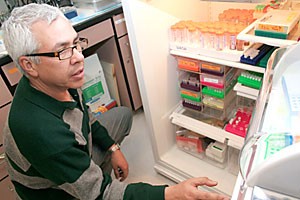One UA researcher has found the real magic behind “”magic mushrooms.””
Dr. Francisco Moreno, an assistant professor of psychiatry, has successfully treated the symptoms of nine patients with obsessive-compulsive disorder using psilocybin, an active ingredient found in hallucinogenic mushrooms.
Moreno said he first got the idea to begin research with psychedelic mushrooms in 1997 after a patient with OCD disclosed that the hallucinogen had helped subdue the symptoms that accompanied his disease.
“”When we utilized the setting that we had, we found that this was well-tolerated and safe, and we were able to detect acute decreases in OCD symptoms,”” Moreno said.
To conduct the research, Moreno obtained permits and licenses from the Drug Enforcement Agency and the Food and Drug Administration.
Moreno’s research team converted an office in the University Medical Center into a makeshift living room – complete with sunglasses and headphones that continually played music – and tested the effects of psilocybin on nine individuals in a total of 27 separate doses made according to the body weight of each subject.
The researchers found everyone had at least a 25 percent drop in their symptoms, while some even lost their symptoms entirely.
When people use psilocybin, the effects of the psychedelic experience usually last between three and 10 hours, Moreno said.
To test the permanence of the subdued symptoms, Moreno had each of the subjects, who ranged in age from their early 20s to late 60s, come back 24 hours after their testing and then again a week later.
“”What we found is that the majority of subjects were still doing better in 24 hours,”” Moreno said. “”One subject that we followed was still doing well at six months.””
Although the test has produced excitement among the team, the first in the country to experiment with psilocybin and its effects on humans, Moreno said the preliminary study is just the first step of his research.
“”We believe it is important to conduct tests repeatedly and compare those studies with placebo studies,”” Moreno said.
While Moreno has no plans to recommend psilocybin as a form of medical treatment to the FDA, he is awaiting approval and funding from the Human Studies Committee to perform further tests of both psilocybin and placebo pills on about 30 subjects.
“”It’s still pretty early in the research of psilocybin and OCD patients,”” Moreno said. “”But it’s an exciting promise that is really important to look at, and I hope to have the ability to move it forward.””
Dr. Lorrin Koran, a researcher at Stanford University specializing in OCD, said he is supportive of the studies involving the effects of psilocybin, although a larger study with placebo subjects will be the telltale examination.
“”Psilocybin is not a practical treatment, has not been definitively demonstrated to work or to benefit patients over longer term and has potential for abuse,”” Koran wrote via e-mail. “”But the authors deserve credit for conducting a difficult study of a very novel approach that may lead to better understanding of OCD pathophysiology and thus to better treatments.””
OCD is a neurological disorder characterized by involuntary movements that can restrict the enjoyment of daily life and affects nearly 1 in 50 adults in the United States alone, according to the OCD Foundation Web site.
Even though the results of his study indicate promise, Moreno discourages self-medication of psychedelic mushrooms, which are both powerful and outlawed by the DEA in the 1970s. They are classified as a Schedule 1 Controlled Substance, meaning a drug that has a high potential for abuse, has no currently accepted medical use and is unsafe for use even under medical supervision.
Dr. Michael Jenike, an OCD specialist and psychiatry professor at Harvard University, said he also believes psychedelic mushrooms could provide insight into new forms of treatment for OCD.
“”I think it is worth looking into in a scientific way,”” Jenike wrote in an e-mail. “”These substances have effects on serotonin, which is likely involved in OCD.””
Pharmacologically, psilocybin works by activating serotonin receptors in the brain, Moreno said. Similar medicine that is less powerful is available on the market.
“”This is not ready to change the way we do medicine,”” Moreno said. “”But it means changes in the ways of thinking creatively and openly in exploring novel approaches for medical conditions that are difficult to treat.””









